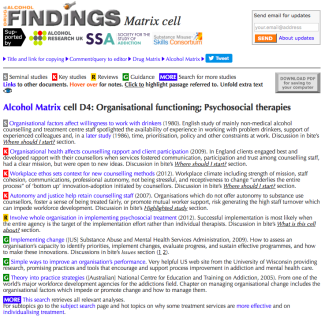Organisational Influences on Psychosocial Therapies

Latest instalment of online course on alcohol treatment research. See if you agree with influential US researchers that “organizational climate underlies the entire process of innovation adoption”, appreciate the effect of high staff turnover and how to reduce it, and ask yourself: Is my service even ready for change? Is change driven by targets just as good for patients as change motivated by the desire to improve their lives?
As well as concrete things like staff, management committees, resources, and an institutional structure, organisations have links with other organisations, histories, values, priorities, and an ethos, determining whether they offer an environment in which staff and patients/clients can maximise their potential. For these and other reasons, agencies differ in how keenly and effectively they seek and incorporate knowledge and implement evidence-based practices. The best might have effective procedures for monitoring performance and to identify when and what improvements are needed, facilitate staff learning, forge links with other organisations, and submit to external accreditation and quality assurance. Research cited in this cell is about the impact of these attributes on the human interactions involved in ‘psychosocial’ therapies, ranging from brief advice and counselling to extended therapies based on psychological theories. Read on...